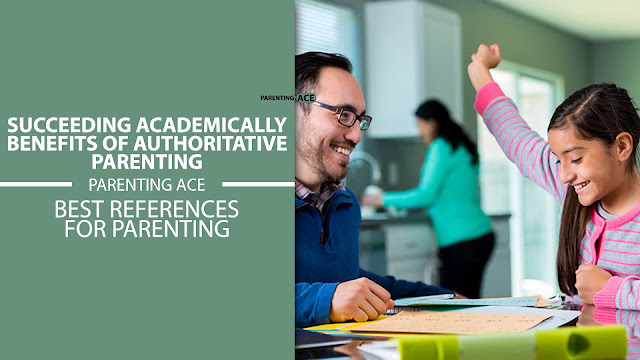Achieving Academic Success: The Benefits of Authoritative Parenting
Unlocking the doors to academic achievement begins not just within the classroom but also within the nurturing embrace of authoritative parenting. In this blog post, we embark on a journey into the intricate relationship between parenting style and academic success, shining a light on the empowering principles of authoritative parenting. As we delve into the profound impact of warmth, support, and clear boundaries on a child's educational journey, we uncover the strategies and benefits that pave the way for academic excellence. Join us as we explore how authoritative parenting lays the foundation for a lifelong love of learning and empowers children to thrive in their academic pursuits.
 |
| Succeeding Academically: Benefits of Authoritative Parenting |
Academic success is a multifaceted concept that extends beyond grades and test scores; it encompasses critical thinking skills, creativity, and a lifelong love for learning. While numerous factors contribute to a child's academic achievement, the role of parenting cannot be overstated. Among various parenting styles, authoritative parenting has been consistently linked with positive outcomes in children's academic endeavors. This article delves into the profound impact of authoritative parenting on academic success, exploring its defining characteristics, benefits, and strategies for implementation.
Defining Authoritative Parenting
Authoritative parenting is characterized by high levels of warmth, responsiveness, and support, coupled with clear expectations and boundaries. Unlike authoritarian parenting, which emphasizes strict control and obedience, authoritative parents foster autonomy and independence while maintaining a nurturing environment. They engage in open communication, provide rationale for rules, and encourage their children to express their opinions and emotions.
Benefits of Authoritative Parenting for Academic Success
- Encourages Self-Discipline: Authoritative parents set consistent expectations for academic performance and behavior, promoting self-discipline and responsibility in their children. By establishing clear guidelines and consequences, they teach their children the importance of accountability and self-regulation, essential skills for academic success.
- Fosters Intrinsic Motivation: Authoritative parents prioritize the development of their children's intrinsic motivation by emphasizing the value of learning for its own sake rather than external rewards or punishments. They create a supportive environment where curiosity, exploration, and intellectual growth are encouraged, instilling a lifelong passion for learning.
- Promotes Critical Thinking Skills: Through open dialogue and active listening, authoritative parents stimulate their children's critical thinking skills. They encourage independent thought, problem-solving, and decision-making, fostering intellectual curiosity and creativity. By allowing their children to voice their opinions and perspectives, they cultivate a sense of confidence and autonomy in academic pursuits.
- Nurtures Positive Relationships with Teachers: Authoritative parents maintain collaborative relationships with teachers and educational professionals, recognizing the importance of partnership in supporting their children's academic development. They actively engage in their children's education, attending parent-teacher conferences, volunteering in school activities, and advocating for their children's needs.
- Cultivates Resilience: Authoritative parenting provides a supportive framework for children to navigate academic challenges and setbacks. By offering encouragement, guidance, and constructive feedback, parents empower their children to persevere in the face of difficulties, developing resilience and coping skills essential for academic success.
Strategies for Implementing Authoritative Parenting
- Establish Clear Expectations: Set clear, age-appropriate expectations for academic performance, behavior, and responsibilities.
- Foster Open Communication: Create a supportive environment where children feel comfortable expressing their thoughts, feelings, and concerns.
- Provide Structure and Consistency: Maintain consistent routines and rules while allowing flexibility for individual needs and preferences.
- Encourage Independence: Empower children to make decisions, solve problems, and take ownership of their learning process.
- Offer Guidance and Support: Provide guidance, encouragement, and resources to help children achieve their academic goals.
In conclusion, authoritative parenting plays a pivotal role in fostering academic success by promoting self-discipline, intrinsic motivation, critical thinking skills, positive relationships with teachers, and resilience. By embodying the principles of warmth, responsiveness, and support, authoritative parents create an environment where children thrive academically and develop the skills necessary for lifelong learning and achievement. As parents strive to cultivate a nurturing and empowering parenting style, they pave the way for their children to excel academically and realize their full potential.




